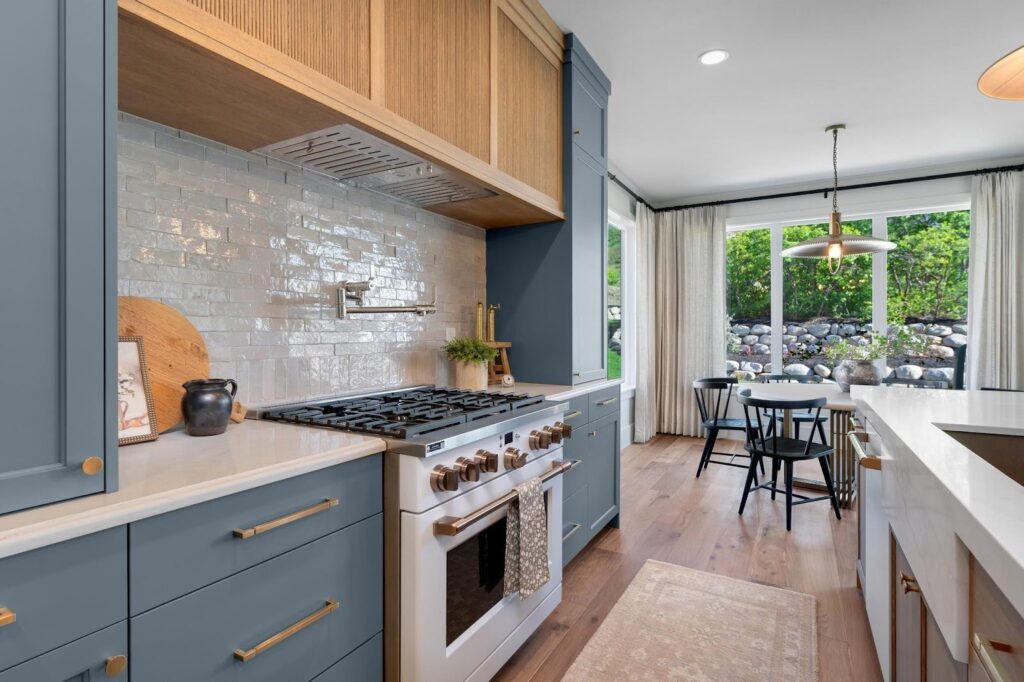Buying a home is one of the most significant and exhilarating decisions you’ll ever make, but it also brings considerable complexity and potential challenges. The process involves various critical factors, including financial readiness and lifestyle needs, each playing a pivotal role in shaping your final decision.
Navigating these complexities might feel overwhelming at times. This guide is designed to demystify the home-buying process. By breaking down the essential considerations into digestible segments, we aim to arm you with the necessary knowledge to confidently navigate through this decision-making maze.
Whether you’re a first-time homebuyer or a seasoned property investor, the insights provided here will help streamline your journey to finding and acquiring your ideal home.
Budget and financing
Establish a realistic budget to anchor your home-buying process. Assess the purchase price as well as the recurring expenses like property taxes, insurance, and maintenance. Knowing what you can afford helps target homes within your financial reach and avoids the disappointment of exploring unaffordable properties.
Financing your home typically involves securing a mortgage, making a strong credit score crucial. A higher credit score often secures better loan terms, such as lower interest rates. Start by reviewing and improving your credit score early in the process to ensure the best possible loan conditions.
Explore various financing options, including traditional fixed-rate mortgages, adjustable-rate mortgages, and government-backed loans. Each option has unique benefits and requirements.
Consulting with a financial advisor or mortgage broker provides personalized advice, helping align your financing choice with your long-term financial goals and current market dynamics. This proactive approach ensures you make informed decisions throughout the home-buying process.
Location and neighborhood
Choosing the right location is crucial when buying a home, as it impacts your daily life and the long-term value of your investment. Start by assessing the safety of potential neighborhoods. Research crime statistics and talk to local residents to understand the community’s safety.
Evaluate how close the neighborhood is to essential services like your workplace, good schools, grocery stores, hospitals, and recreational facilities. A conveniently located neighborhood reduces your daily commute and enhances your quality of life by providing easy access to amenities.
Also, explore the area’s potential for future development. New infrastructure projects, schools, or commercial developments significantly affect property values and the neighborhood’s appeal.
Understanding these factors helps you choose a location that meets your current needs and promises growth and appreciation in value. This strategic approach ensures your home purchase is satisfying in the short term and a sound investment in the long term.
Size and layout
When selecting your home, assess the necessary size based on your family’s needs. Consider how many bedrooms will accommodate your family today and any foreseeable additions, such as new children or elderly relatives moving in. Also, plan for spaces that might serve multiple purposes, like a home office, gym, or play area.
The functionality of a home’s layout is as important as its size. A layout should match your daily lifestyle, facilitating smooth movement and activity within the space.
For families with young children, an open floor plan might be ideal, allowing for easy supervision. For those who entertain frequently, seek a layout that ensures a seamless flow among the kitchen, dining, and living areas.
Examine the connections between different areas in the house, ensuring the layout makes practical sense for your daily routines. For example, a large kitchen next to a spacious pantry benefits frequent cooks, while positioning the laundry room near bedrooms simplifies household tasks.
Choosing a home that fits your size needs and features a functional layout will enhance your living experience. Every area of your home will be purposeful and contribute to overall harmony and efficiency.
Condition of the property
Conduct thorough inspections to uncover any hidden problems with a property before buying. Experienced inspectors reveal potential issues like structural weaknesses, outdated electrical systems, or old plumbing that could lead to significant future expenses.
Consider the age of the property, as it often affects the ongoing maintenance needs and the likelihood of needing renovations. While older homes may offer charm, they typically require updates to systems such as heating, cooling, and roofing. Assess the condition of major components to estimate the maintenance budget necessary to maintain the home.
Knowing the age and current state of the property helps planners effectively for potential renovations. Whether updating the kitchen, adding a bathroom, or reconfiguring living spaces, understanding the home’s condition allows you to realistically budget for improvements.
This preparation ensures you are financially ready for the costs associated with customizing the house to meet your preferences and lifestyle.
Market timing and economic factors
Analyze current market conditions and real estate trends critically when considering purchasing a home. Keep abreast of local housing market trends, such as supply and demand dynamics, which significantly influence home prices and availability.
Economic factors like interest rates and employment rates have substantial impacts on the housing market. Lower interest rates generally reduce borrowing costs, potentially boosting demand for real estate as more buyers find it affordable to enter the market. Conversely, higher rates might slow down the market, making it tougher to sell or buy homes.
Strong employment rates increase consumer confidence and spending power, encouraging more people to invest in real estate. On the other hand, in periods of economic uncertainty or high unemployment, potential buyers may hesitate, affecting demand and possibly leading to lower home prices.
Resale value
Consider the factors that might influence the future resale value of the home when you purchase. Thinking long-term is crucial, as the decisions you make today will impact the property’s value if you decide to sell later.
Location remains a key determinant of resale value; homes in desirable neighborhoods or near essential amenities like schools, parks, and shopping centers typically maintain or increase their value over time. Also, evaluate the area’s future development plans — new schools, transportation infrastructure, or commercial projects boost property values.
The home’s condition and updates also play a significant role. Homes that are well-maintained and feature modern upgrades like energy-efficient appliances, updated kitchens, and bathrooms tend to attract higher offers. Conversely, properties that require maintenance or are outdated may depreciate in value or take longer to sell.
Additionally, let market trends guide your buying decisions. In a rising market, nearly any property may gain value, while in a declining market, choosing a home with stable demand characteristics is safer.
By understanding these elements and considering how they might change, you position yourself to make a purchase that not only satisfies your immediate needs but also serves as a sound investment in the future.
Legal and administrative aspects
Before you buy a home, thoroughly navigate the essential legal and administrative steps to ensure a smooth and secure transaction.
Start by reviewing critical documents, such as the title deed, to verify the seller’s ownership and confirm the property is free from legal disputes or liens. Check zoning regulations, property taxes, and any homeowner association (HOA) requirements to avoid surprises.
A real estate agent plays a crucial role in guiding you through this process. They help you find legitimate listings, negotiate fair terms, and ensure all paperwork aligns with local regulations. Involving a legal advisor adds a layer of protection; they review contracts, verify the property’s legal status, and ensure compliance with laws.
Also, familiarize yourself with necessary disclosures, such as the property’s condition, structural issues, or past renovations. Make sure agreements — like purchase contracts and loan documents — clearly state the terms, including price, deadlines, and contingencies for inspections or financing.

Lifestyle considerations
When choosing a home, actively consider how it aligns with your lifestyle preferences and long-term plans. A home is a place where your life unfolds, and your future takes shape. Reflect on the community surrounding the home.
Does it offer social and recreational activities that match your interests? Assess the local culture to ensure it resonates with your values and lifestyle, contributing to a fulfilling living experience.
Also, evaluate your daily commute. A beautiful home that requires a long commute might affect your quality of life and daily satisfaction. Analyze the accessibility to essential services like healthcare, education, and shopping. These factors not only impact your daily convenience but also play a part in your overall contentment and well-being in a new home.
Considering these aspects helps ensure that the home you choose not only meets your current needs but also supports the life you envision for yourself and your family in the years to come.
Emotional preparedness
Buying a home is an emotional journey that demands readiness for a serious commitment. Recognizing the emotional weight of this decision is crucial. A new home often symbolizes a new chapter in life, carrying with it hopes, dreams, and sometimes anxieties about the future. As such, feeling emotionally prepared and stable is as important as being financially capable.
The process can also be stressful, with numerous decisions leading to potential fatigue. To manage this stress effectively, adopt strategies like taking breaks during the home search process, setting clear and manageable goals, and perhaps most importantly, seeking support from family, friends, or professionals who offer guidance and reassurance.
Maintaining open communication with your partner or co-buyer also prevents misunderstandings and ensures that both parties feel heard and involved in every step.
Embracing these approaches helps safeguard your mental health and keeps the journey to homeownership a positive and fulfilling experience.
Frequently asked questions about buying a home
What should I consider when setting a budget for a home purchase?
A: Factor in not only the purchase price but also additional costs like closing fees, property taxes, insurance, and maintenance. Ensure the budget aligns with your overall financial goals to avoid overextending yourself.
How do I choose the right location for my new home?
A: Consider your daily needs and lifestyle preferences. Look for a location that balances proximity to work, quality schools, amenities, and community culture. Research the area’s safety and potential for future development to ensure it’s a fit for your long-term living needs.
What is the importance of a home inspection?
A: Home inspections are crucial to uncover any hidden issues with the property that could lead to costly repairs. An inspection helps ensure the home is safe, up to code, and a sound investment.
How can I ensure the home I’m buying has good resale value?
A: Look for homes with desirable features like modern kitchens, energy efficiency, and flexible living spaces. Consider the home’s location and community development plans, as these can significantly impact future value.
What legal checks are necessary when buying a home?
A: Conduct a title search to ensure there are no liens or disputes. Review all zoning laws and property disclosures. It’s advisable to work with a real estate attorney to navigate contracts and closing documents.
How do interest rates affect my home purchase?
A: Interest rates directly influence your mortgage payments and the total cost of your home over time. A lower rate means lower monthly payments and less interest paid throughout the life of the loan.
Should I work with a real estate agent?
A: A real estate agent can provide valuable insights into the market, help negotiate deals, and guide you through the buying process. Their expertise is especially beneficial for first-time buyers or those unfamiliar with the area.

Buy your first home from Patterson Homes
Navigating the complexities of buying a home can overwhelm anyone, but partnering with the right company simplifies the entire process. Patterson Homes excels as your trusted ally, offering expertise, reliability, and a deep understanding of what makes a house a true home.
Whether evaluating market conditions, deciding on the ideal layout, or considering long-term resale value, Patterson Homes guides you through making informed decisions.
With Patterson Homes, you’re not simply buying a property; you’re crafting a future in a space tailored to meet and exceed your expectations. Explore the possibilities with Patterson Homes and take the first step towards a home that enhances your lifestyle and enriches your life.
Contact Patterson Homes for a seamless, supportive, and satisfying home-buying journey.

